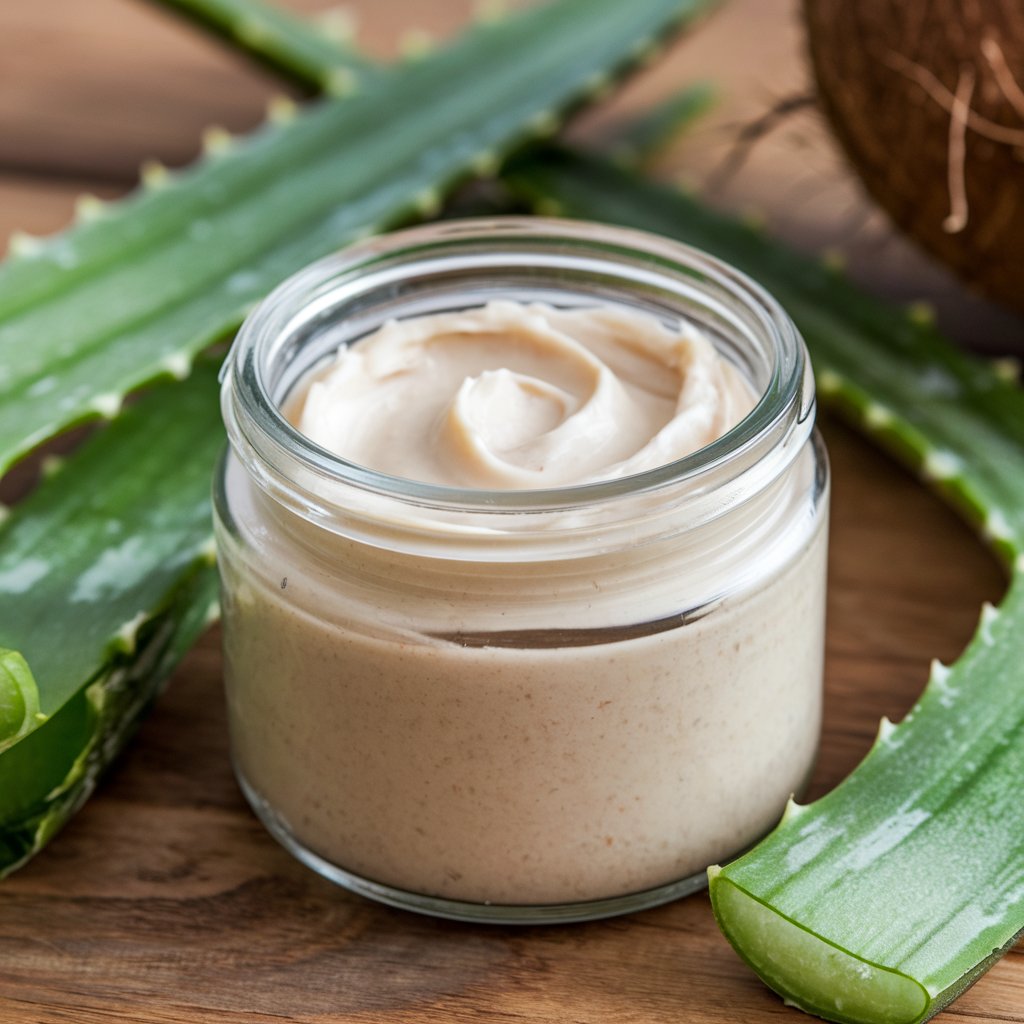- After a week of use, my skin became smoother, more supple, and less irritated
- Since coconut oil is comedogenic, the cream might be too oily for acne-prone skin
- Dermatologists caution that coconut oil may clog pores for some users
Lately, I’ve become a bit obsessed with the idea of incorporating organic ingredients into my skincare routine. The more I delve into the world of natural skincare, the more I realize how powerful these simple ingredients can be. Recently, I stumbled upon a homemade face cream recipe that combines aloe vera and coconut oil—a mix that’s been making the rounds on various skincare platforms. The buzz around this combination piqued my interest, and I just had to try it out for myself. After a week of using it, I’m excited to share my experience and findings with you.
Why I Chose Aloe Vera and Coconut Oil for My Skin
As someone who loves experimenting with natural remedies, I’ve always kept aloe vera and coconut oil in my skincare arsenal. Both of these ingredients are celebrated for their soothing, hydrating, and healing properties. But the idea of combining them into a single face cream was new to me, and I was eager to see how my skin would respond.
Aloe Vera in Skincare: A Scientifically Proven Wonder
Aloe vera is a popular ingredient in skincare products due to its numerous benefits for skin health. Research has shown that aloe vera gel, both as a topical application and as an ingredient in skincare products, can provide the following benefits:
Anti-inflammatory and Wound Healing Properties
Aloe vera has anti-inflammatory properties that can help reduce pain, swelling, and soreness associated with wounds or injuries. It also supports the production and release of collagen, which can speed up wound healing time and limit scarring. Studies have shown that aloe vera can reduce the healing time of first-degree and second-degree burns.
Aloe vera is an excellent moisturizer for the skin due to its high water content (98%). It helps hydrate, soothe, and cool the skin, keeping it soft and supple. The cooling effect of aloe vera makes it particularly useful for treating rashes or sunburns. Additionally, aloe vera contains vitamins A, C, and E, which are antioxidants that help protect the skin from damage caused by free radicals. Its antimicrobial properties help protect the skin from harmful bacteria and pathogens. Regularly applying a small amount of aloe vera to the face can help manage these skin conditions.
Coconut Oil: The Ultimate Moisturizer
Coconut oil contains medium-chain fatty acids like lauric acid. These fatty acids have antimicrobial properties that help protect the skin from harmful bacteria and fungi. Dermatologists suggest that coconut oil can reduce yeast levels on the skin, which may help with inflammatory issues.
Besides its antimicrobial effects, coconut oil is a great moisturizer. It helps the skin retain moisture, preventing dryness and improving the skin’s protective barrier. This makes it particularly useful for people with dry skin conditions, like eczema. Coconut oil absorbs quickly, giving immediate hydration and leaving the skin smoother. Regular use can also reduce fine lines and wrinkles, giving the skin a more youthful look.
The DIY Face Cream Experiment
So, armed with a little research and a lot of enthusiasm, I decided to whip up my own batch of aloe vera and coconut oil face cream. The process was simple and fun, and within minutes, I had a luxurious cream ready to apply. But the big question was: would it work?
Wondering How to Use Aloe Vera Gel on Face at Night? Follow These Steps
My One-Week Trial: Results and Reflections
I’ve been using this homemade face cream every day for a week now. My skin feels more soft, smooth, and hydrated. The texture of the cream is light and easily absorbed, leaving no greasy residue behind—something I was initially concerned about given the oil content.
The most noticeable change has been how supple and plump my skin feels. The combination of aloe vera and coconut oil seems to provide a perfect balance of hydration and nourishment. I’ve also noticed that any redness or irritation I had before starting this experiment has reduced, which I attribute to the anti-inflammatory properties of aloe vera.
A Little Goes a Long Way
One of the things I love most about this cream is how little you need to use it to get great results. A small amount is enough to cover my entire face, and it feels like my skin drinks it up immediately. I’ve even started using it on my hands and elbows, and it’s been equally effective.
What Research Says About Aloe Vera and Coconut Oil
While personal experience is invaluable, I always like to back up my skincare experiments with a bit of research. So, I did some digging to see what the scientific community has to say about aloe vera and coconut oil, particularly when used together in skincare.
Aloe Vera in Skincare: A Scientifically Proven Wonder
Aloe vera is a popular ingredient in skincare products due to its numerous benefits for skin health. Research has shown that aloe vera gel, both as a topical application and as an ingredient in skincare products, can provide the following benefits:
Anti-inflammatory and Wound Healing Properties
Aloe vera has anti-inflammatory properties that can help reduce pain, swelling, and soreness associated with wounds or injuries. It also supports the production and release of collagen, which can speed up wound healing time and limit scarring. Studies have shown that aloe vera can reduce the healing time of first-degree and second-degree burns.
Aloe vera is an excellent moisturizer for the skin due to its high water content (98%). It helps hydrate, soothe, and cool the skin, keeping it soft and supple. The cooling effect of aloe vera makes it particularly useful for treating rashes or sunburns. Additionally, aloe vera contains vitamins A, C, and E, which are antioxidants that help protect the skin from damage caused by free radicals. Its antimicrobial properties help protect the skin from harmful bacteria and pathogens. Regularly applying a small amount of aloe vera to the face can help manage these skin conditions.
Coconut Oil: A Multifaceted Skin Healer
Coconut oil has been a subject of numerous studies, many of which highlight its moisturizing, antibacterial, and anti-inflammatory properties. According to a study in the International Journal of Molecular Sciences, the lauric acid in coconut oil not only provides deep hydration but also offers protection against harmful microorganisms that can cause skin infections.
Moreover, coconut oil has been shown to improve skin barrier function and reduce trans-epidermal water loss (TEWL), which is crucial for maintaining healthy, hydrated skin. Another study published in Dermatitis found that coconut oil can be as effective as mineral oil when used as a moisturizer for treating mild to moderate xerosis (dry skin).
The Power of Combining Aloe Vera and Coconut Oil
A study found that using a mix of aloe vera gel and coconut oil can treat dry skin. This combination helps hydrate the skin, repair dry patches, and improve smoothness and softness. Aloe vera works as a natural moisturizer, while coconut oil provides essential fatty acids for skin health. Together, they create a powerful hydrating blend suitable for both sensitive and oily skin types.
Research suggests that aloe vera gel and coconut oil can help reduce wrinkles, fine lines, and dark spots. The mixture promotes cell rejuvenation and boosts collagen production, which helps tighten the skin and increase elasticity, reducing signs of aging. Aloe vera offers enzymes and vitamins that aid in cell turnover, while coconut oil delivers key nutrients for healthy skin.
What Users Are Saying: A Dive into Online Reviews
In addition to scientific research, I also turned to online reviews and forums to see what other users had to say about using aloe vera and coconut oil together. The consensus was overwhelmingly positive, with many people reporting similar results to mine.
Positive Feedback and Success Stories
users have found coconut oil and aloe vera to be a powerful combination for both hair and skin.
Mae raved “I loved this so much! My family is so crazy about it and keeps using it!” Reviewers appreciate how the mixture makes their hair softer, stronger and silkier.
Terrie mentioned that when making the aloe vera and coconut oil moisturizer, the aloe sometimes separates from the oil. The article advises that this is normal since it’s mixing water and oil, and you can just shake or stir it back together.
Cheryl asked if using aloe vera without xanthan gum, like the Seven Minerals brand, would make a difference. The response was that it should work the same, but you may need to shake it up more often to blend the oil and aloe together.
Dermatologists’ Take: What the Experts Say
While personal experiences and online reviews can be helpful, I also wanted to know what dermatologists think about using aloe vera and coconut oil on the skin. Here’s what the experts have to say.
Many dermatologists recommend using aloe vera and coconut oil together for their skin and hair benefits. Dr. Sejal Shah, a board-certified dermatologist, states
“Aloe vera and coconut oil are both great natural ingredients that can be beneficial for the skin and hair when used properly.” Aloe vera contains vitamins, minerals, amino acids and other compounds that can soothe inflammation, moisturize and promote healing. Coconut oil is rich in fatty acids that deeply condition and protect hair and skin.
Dr. Hadley King, a dermatologist in New York City, notes
“The combination of aloe vera’s soothing properties and coconut oil’s moisturizing effects can be very nourishing for the skin.” Aloe vera gel can be used topically to treat sunburns, acne, eczema and other skin conditions. When mixed with coconut oil, it creates a hydrating moisturizer suitable for all skin types, including sensitive.
However, some dermatologists caution about potential downsides. Dr. Debra Jaliman, a New York City-based dermatologist, warns
“While aloe vera and coconut oil are generally safe, some people may be allergic or sensitive to them.” She advises doing a patch test first before applying all over the skin or scalp. Additionally, Dr. Jaliman notes
“Coconut oil can clog pores in some individuals, so it’s best to use it sparingly on the face if you are prone to acne.”
The Controversy Around Coconut Oil
Coconut oil is more controversial in the dermatology world. While it’s widely recognized for its moisturizing properties, some dermatologists warn that coconut oil can clog pores and cause breakouts, especially for those with acne-prone skin. Dr. Shereene Idriss, a board-certified dermatologist, advises people with oily or acne-prone skin to be cautious when using coconut oil on their face.
That said, many dermatologists still recommend coconut oil for those with dry or sensitive skin, as long as it’s used in moderation and as part of a well-rounded skincare routine. It’s also important to choose high-quality, organic coconut oil to avoid any potential irritants or contaminants.
My Final Thoughts
After a week of using my homemade aloe vera and coconut oil face cream, I’m definitely a fan. My skin feels soft, supple, and well-hydrated, and I love the simplicity and purity of the ingredients. While it might not be the perfect solution for everyone—especially those with oily or acne-prone skin—it’s a great option for anyone looking to incorporate more natural, organic products into their skincare routine.
If you’re curious about trying this DIY face cream yourself, I recommend starting with a small batch and seeing how your skin responds. And as always, do a patch test before applying any new product to your face, just to be safe.
Recipe Recap: How to Make Your Own Aloe Vera and Coconut Oil Face Cream
In case you’re interested in making your own face cream, here’s a quick recap of the recipe I used:
Ingredients:
- 2 tablespoons of pure aloe vera gel
- 2 tablespoons of organic coconut oil
Instructions:
- Start by melting the coconut oil in a double boiler or microwave until it becomes liquid.
- Mix the melted coconut oil with the aloe vera gel in a bowl. Whisk the mixture until it forms a smooth, creamy texture.
- Transfer the cream into a clean, airtight container and store it in a cool, dry place.
- To use, apply a small amount to your face and neck after cleansing, massaging gently until fully absorbed.
Feel free to tweak the recipe to suit your skin’s needs. For example, you can add a few drops of essential oils like lavender or tea tree oil for added benefits. Just remember to keep it simple and natural—that’s the beauty of DIY skincare!

I’m a devoted organic skincare enthusiast, passionate about the natural, wholesome goodness that organic products bring to our skin.
Organic skincare isn’t just a hobby for me—it’s a lifestyle. Every product I use, recommend, and write about has been carefully chosen for its purity and effectiveness. Everything I write about is backed by scientific studies, dermatologists’ opinions, and user experiences.
I also excel at tackling skincare challenges with innovative, organic solutions.


